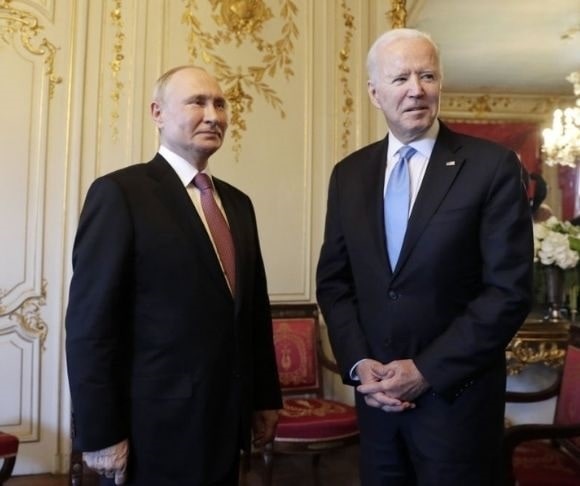The worldwide anticipation of the Dec. 7 video call between Presidents Joe Biden and Vladimir Putin was palpable. For America’s chief executive, Biden’s credibility was on the line. Could the U.S. president persuade the Kremlin boss that as the commander-in-chief he would hold the line on supporting Ukraine’s sovereignty should the Russians invade the former Warsaw Bloc nation? The two-hour secure video-link conversation opened with an exchange of greetings, Putin at his residence in Sochi on the Black Sea and Biden in the White House situation room. But the cordial opening of the superpower meeting was in sharp contrast to actions on the ground along Ukraine’s border.
 According to Michael Schwirtz, writing for The New York Times, “The Ukrainian military exchanged fire with Russian-backed separatists using machine guns and grenade launchers on Tuesday, the day on which President Biden and President Vladimir V. Putin of Russia discussed ways to ease mounting tensions in the region.” The skirmish was a reminder of why the two leaders were talking.
According to Michael Schwirtz, writing for The New York Times, “The Ukrainian military exchanged fire with Russian-backed separatists using machine guns and grenade launchers on Tuesday, the day on which President Biden and President Vladimir V. Putin of Russia discussed ways to ease mounting tensions in the region.” The skirmish was a reminder of why the two leaders were talking.
The wrap-up of the meeting relayed by U.S. National Security Advisor Jake Sullivan characterized the call as “useful.” At the scheduled press briefing, there was disappointment for those hoping to hear specifics about what the United States would do if Russia invaded Ukraine. For the most part, Sullivan reiterated what the White House said Biden was prepared to do before the meeting, saying that “… if Russia further invades Ukraine, the United States and our European Allies would respond with strong economic measures.” A reporter asked if these sanctions would be more significant than those applied in 2014 that did not stop the Russian annexation of Crimea. Sullivan replied, “I will look you in the eye and tell you, as President Biden looked Putin in the eye and told him today, that the things we did not do in 2014 we are prepared to do now.” However, Sullivan did not elaborate on what those might be; consequently, the American public is left to speculate.
Retired Army General Jack Keane, commenting on Fox News, suggested that taking Russia out of the global financial system would be a potent tactic since it would ruin the Kremlin’s ability to conduct international financial transactions. Another effective sanction would be halting the Nord Stream 2 gas pipeline from becoming operational.

(Photo by Mikhail Metzel\TASS via Getty Images)
On that topic, several questions posed during the briefing centered on whether the United States could stop Russia from opening the Nord Stream 2 pipeline. Though Sullivan was reluctant to give a direct answer, Reuters’ Andrea Shalal reported that administration officials briefed members of Congress that “… they have an understanding with Germany about shutting down the Nord Stream 2 pipeline if Russia invades Ukraine.” That’s a specific economic arrow in the U.S. quiver, since Russia depends on its one-commodity oil and gas exports to bolster a gross domestic product half that of California.
For Putin, the most crucial issue is a guarantee that there would be no eastward expansion of NATO capability. Kremlin officials said, “Russia is seriously interested in obtaining reliable, legally fixed guarantees that rule out NATO expansion eastward and the deployment of offensive strike weapons systems in states adjacent to Russia.” However, Sullivan indicated that no such commitment was made.
As BBC News put it, “Few expected a breakthrough, but Moscow said talks were needed as tensions in Europe are ‘off the scale.’” But it’s not clear that those were reduced following the discussion. According to Reuters, “Beyond the agreement to hold further discussions, there was no sign of any narrowing of positions in Moscow’s readout of the conversation, which followed weeks of tension over the massing of Russian troops on the border with Ukraine.” After all the hype, it’s unclear that the United States and Russia moved an inch off their entrenched positions before the meeting.
The views expressed are those of the author and not of any other affiliation.
~ Read more from Dave Patterson.



